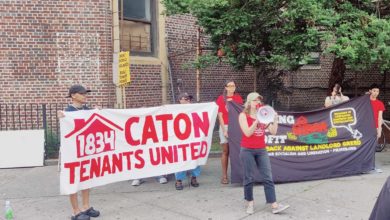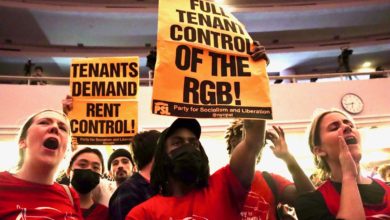There are over 8 million people in New York City proper. Of those, 67 percent pay rent to a landlord. During the course of the economic crisis, many New Yorkers have lost their jobs or have had their hours and wages cut, yet the first-of-the-month rent bill has never been reduced.
For working-class people struggling to make ends meet, there have been tough choices. Does one pay medical bills, tuition … or rent? The high cost of living and total inadequacy of supportive services threatens the ability of many renters to keep a roof over their heads.
However, the grief is not shared by all. By doing nothing besides owning homes, a small, privileged group continues to line their pockets with the hard-earned wages of renters.
Among them are Richard Lefrak with more than 70,000 apartments in Queens; Joel Wiener with more than 21,000 apartments in the Washington Heights area of Manhattan; Jerry Speyer and Robert Tishman with over 11,000 apartments in Cooper/Stuvyesant in lower Manhattan; and Jacob Selechnik with 7,000 apartments in the Bronx.
Each of these men makes a killing by virtue of owning what they call “real estate” and tenants call “home.” The rent they collect is nothing but legalized extortion, with the threat of eviction held over the tenants’ heads.
Portrait of a profiteer
The New York Times featured Selechnik in its Nov. 19 issue, detailing his knack for thievery. For over 50 years, Selechnik has amassed a real estate kingdom in the poorest urban county in the country. He has profited from the slumlord business and is today estimated to be worth more than $500 million. While working-class people suffer, Selechnik has seized on the economic crisis as a chance to continue building his kingdom.
“If the opportunity avails itself where I can buy some properties from the banks, I will, inside and outside of the Bronx,” he told the New York Times.
The Federal Home Loan Mortgage Corporation has blacklisted him, refusing to sell him any foreclosed properties because of his notorious slumlord reputation. He has evaded the blacklisting by having fellow landlords buy the foreclosed properties and flip the ownership to him.
In 2007, his properties had 23,127 violations on record—an average of 3.6 violations per apartment—and he still owes $13,855 in outstanding fines to the city. He also owes the Department of Housing Preservation and Development $91,528 for emergency repairs made to 68 of his buildings. In the 1980s, the HDP sued Mr. Selechnik for failure to provide heat and hot water to 40 of his buildings.
In November, more than 30 residents of Selechnik’s building at 3525 Decatur Avenue filed complaints over the bedbug infestation, defective ramps and lack of a full-time superintendent in their building. Selechnik’s response has downplayed the severity of his violations, cynically claiming that only four tenants have bedbugs. When questioned about mold accumulations in many of his buildings, he blamed the residents, saying, “Sometimes they don’t open the windows and let the walls breathe.”
When he does respond to complaints, Selechnik uses the cost of building repairs to push up rents. Dino Rossi of 2720 Grand Concourse saw his rent rise from $1,227.23 to $1,501.64 a month after repairs he had requested for more than three years were completed.
Selechnik is not unique among landlords. The likes of Selechnik, Lefrak, Tishman and Wiener are the real culprits behind horrible building conditions, gentrification and rent hikes. The capitalist system endows them with the right to steal from workers, while providing inadequate and unsafe living spaces.
Fighting the scourge of landlordism
Landlords’ abuses have not gone unchallenged. Tenants’ rights activists have fought hard for affordable housing and proper living conditions. These struggles can often have positive outcomes that protect and improve renters’ rights, but the struggle for affordable housing under capitalism is an uphill battle.
The system protects the “right” of landlords to maximize profits over the need of working-class families to have a place to live. Every year in New York, as in other cities and states across the nation, landlords dump millions of dollars into the pockets of “our elected” politicians, ensuring that their greedy ambitions are protected by the political players in Albany and other state capitals and city councils. Under this kind of democracy, only the rich get a real vote.
A report done earlier this year showed that since January 2007, city landlords have given $2.5 million to Democrat and Republican politicians. Democratic State Senator Malcolm Smith of Queens, who faced no opponent in the last election, received $236,000 from the landlord interests in the city. Democratic State Senator Jeff Klein of the Bronx received $237,290 from the same sources. Democratic State Senator Carl Kruger, whose district includes over 40,000 rent-stabilized units, received $27,000 from landlords. He has refused to take a position on the last 10 rent reform bills in Albany.
There is no doubt that the only force capable of stopping greedy landlords and the system that works in their favor is that of the organized people. Victory requires an independent fight-back movement in New York City and beyond that demands that homes be a right, not a commodity.





